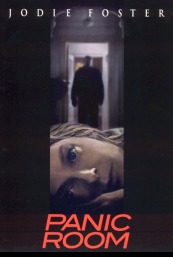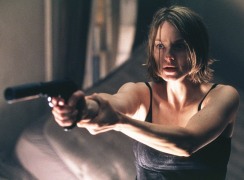|
Panic Room
|
| |
 |
USA, 2002. Rated R. 118 minutes.
Cast:
Jodie Foster, Kristen Stewart, Forest Whitaker, Jared Leto, Dwight Yoakam,
Patrick Bauchau, Ian Buchanan, Ann Magnuson
Writers: David Koepp
Music: Howard Shore
Cinematographer: Conrad W. Hall, Darius Khondji
Producers: Ceán Chaffin, Judy Hofflund, David Koepp, Gavin Polone
Director: David Fincher
LINKS
|
 ake
a thriller and strip it down to its bare essence. Don't make it about theoretical
threats to the entire human race. Forget the romantic angles and redemption
subplots. Focus only on this: you are trapped in a tiny space in your own home,
and you can't get out.
ake
a thriller and strip it down to its bare essence. Don't make it about theoretical
threats to the entire human race. Forget the romantic angles and redemption
subplots. Focus only on this: you are trapped in a tiny space in your own home,
and you can't get out.
That's it. That's Panic Room, the latest film from visionary director
David Fincher. Everything else is just setup. Briefly, the setup goes like this:
recently divorced Meg Altman (Jodie Foster) and her tomboyish daughter Sarah
(Kristen Stewart) move into a stately, expansive brownstone formerly owned by
some rich old coot. To protect against home invasion, proletarian revolution,
or what have you, the coot commissioned a vault in the heart of the house called
a "panic room." Encased in steel, the room contains a supply of water, camera
monitors covering most of the house, and a telephone on an independent line.
It is impregnable. All you have to do is lock the door, call the cops, and wait
for help. Supposedly.
Ah, but it's Meg and Sarah's first night in their unsettlingly spacious new
home, and they haven't hooked up the panic room's phone. Plus, the home invaders
aren't after the stereo equipment. They want to get into the panic room, and
aren't about to let a few inches of steel deter them. Panic Room is two
hours of cat and mouse, except the mice are already in the trap.
Any weaknesses in the Panic Room come from the script, which contains
noticeable plot incongruities1 and
weak characterizations. The trio of criminals are stock characters, consisting
of the none-too-bright one (Jared Leto in dreadlocks), the sensitive one (Forest
Whitaker), and the complete psycho (Dwight Yoakam). Their relationship evolves
predictably.
The script makes up for it by not containing any egregious implausibilities
or violations of the laws of physics. The well-cast actors, particularly Foster
(wisely choosing a role suited to her talents, which do not include warmth),
make the most of what they're given. Fincher ratchets up the whole deal with
his amazing visual flair. At times he is quite obviously showing off--like with
the sliding camera movements (partly computer-generated) through the house,
tracking Whitaker's attempts to enter via the front door, the back door, the
windows, and finally the skylight, seemingly in a single take. Sarah remarks
that the house is dark, at which point you have to wonder if she's not aware
that she's in a David Fincher movie. Of course it's dark! It's green-tinged
as well--another trademark of Fincher and cinematographer Darius Khondji--which
contributes to the gritty, menacing mood, accentuated by Howard Shore's brooding
score. The opening credits, much like those of Fincher's Fight
Club, are a treat unto themselves, even though they have nothing to
do with the story.
If it is possible to make a good movie out of a mediocre script, Panic Room
is that movie. It's also the sort of film a director makes after getting burnt
by critics for a high-risk outing like Fight Club. Panic Room
looks edgy but the content is safe, big-grossing thriller stuff, designed to
re-establish a director's dollar value. This may be simple market savvy on Fincher's
part. If he continues to alternate risks with sure bets, he should have a long,
productive, and interesting career.
1 NOTE
with SPOILERS (if you have not yet seen
the film, do not read): For example, why doesn't the panic room have an
independent air supply? Moreover, when Meg talks to the cops at the front door
while the bad guys watch via camera, she has every opportunity to let them know
something is wrong. The bad guys can't hear the conversation. It would have
been easy to say, "Don't react. We're on camera. We're in trouble. Leave calmly
and come back with Steven Seagal." For that matter, once Meg is out of the panic
room, she is free to use her cell phone to call whoever she wants. Finally,
in the predicable department, why do ninety percent of these movies have to
end with the money blowing away in the wind? Not only does Hollywood's moral
message never change, Hollywood's way of saying it never changes either. These
are minor gripes, though.
Review
© April 2002 by AboutFilm.Com and the author.
Images © 2002 Columbia Pictures. All Rights Reserved.


